When comparing two formidable contenders in the SUV market, the Lexus RX and Mazda CX-80, it’s clear that innovation, performance, and practicality play crucial roles in defining their appeal. Both vehicles offer rich features and advanced engineering, but which one truly stands out? Let’s dive into their technical specifications and innovations to unveil their strengths.
Lexus RX vs Mazda CX-80 - Differences and prices compared
Compare performance (371 HP vs 327 HP), boot space and price (63300 £ vs 49300 £ ) at a glance. Find out which car is the better choice for you – Lexus RX or Mazda CX-80?
Performance and Powertrains
The Lexus RX offers a versatile range of powertrains, including full hybrid and plug-in hybrid options, with outputs ranging from 250 HP to a staggering 371 HP. Its engines, culminating in the robust 371 HP variant, provide a seamless blend of power and efficiency, optimized with a Continuously Variable Transmission (CVT) that promises smooth acceleration from 0-100 km/h in as few as 6.2 seconds.
In contrast, the Mazda CX-80, being a newcomer for 2024, presents a choice between a plug-in hybrid and a Diesel MHEV, with its maximum power reaching 327 HP. The CX-80 matches the RX’s all-wheel-drive capability, ensuring all-weather performance, but slightly lags in acceleration with the 0-100 km/h time at 6.8 seconds for the more powerful variant.
Fuel Efficiency and Emissions
Fuel efficiency is a critical factor for many buyers, and here the Lexus RX showcases impressive capabilities, especially in its hybrid configurations, which consume as little as 1.1 L/100 km in electric mode, translating to CO2 emissions as low as 25 g/km. This makes it an excellent choice for eco-conscious consumers.
The Mazda CX-80, with an electric range of 60 km, supports efficient driving at lower speeds but has a higher overall consumption of 5.7 L/100 km in its more powerful diesel variant. Its CO2 emissions peak at 148 g/km, which is still commendable but less competitive compared to the Lexus RX.
Interior Space and Comfort
One of the significant differences between these two SUVs is the seating capacity. The Lexus RX comfortably seats five, while the Mazda CX-80 expands that to seven, making it an appealing choice for families or those needing extra passenger space. However, this comes at the cost of trunk capacity—where the RX boasts a more robust 461 L compared to the CX-80's 258 L, reflecting its focus on luxury over utility.
Interior quality is paramount for both brands, and Lexus is renowned for its opulent finishes and premium materials. The RX interiors offer an elegant design, emphasizing a serene and comfortable ride. Meanwhile, Mazda leans towards a sporty aesthetic that resonates with driving enthusiasts but may lack some of the high-end touches present in the RX.
Technological Innovations
Both models are equipped with a variety of cutting-edge technologies. The Lexus RX features the latest in infotainment with a user-friendly touchscreen and advanced voice recognition systems, making navigation and multimedia access smooth and intuitive. Additionally, it comes with advanced safety features, such as adaptive cruise control and lane-keeping assistance, ensuring a secure driving experience.
The Mazda CX-80 is equally impressive, boasting intelligent connectivity features that integrate seamlessly with smartphones. The vehicle also includes a comprehensive suite of safety technologies, although its activation might require an initial learning curve due to its unique interface.
Conclusion
In conclusion, the choice between the Lexus RX and Mazda CX-80 ultimately comes down to individual needs and preferences. If you prioritize a more luxurious experience with robust hybrid technology and superior trunk space, the Lexus RX emerges as the front-runner. However, if seating capacity, utility, and a sporty drive are higher on your list, the Mazda CX-80 presents a compelling argument. Both vehicles underscore their manufacturers' commitment to innovation, efficiency, and safety, promising an exhilarating driving experience in their own rights.
Here’s where it gets real: The technical differences in detail
Costs and Efficiency:
Price and efficiency are key factors when choosing a car – and this is often where the real differences emerge.
Mazda CX-80 has a noticeable advantage in terms of price – it starts at 49300 £ , while the Lexus RX costs 63300 £ . That’s a price difference of around 13972 £.
Fuel consumption also shows a difference: Lexus RX manages with 3.30 L and is therefore clearly perceptible more efficient than the Mazda CX-80 with 4 L. The difference is about 0.70 L per 100 km.
As for electric range, the Lexus RX performs slightly better – achieving up to 67 km, about 7 km more than the Mazda CX-80.
Engine and Performance:
Under the bonnet, it becomes clear which model is tuned for sportiness and which one takes the lead when you hit the accelerator.
When it comes to engine power, the Lexus RX has a a bit edge – offering 371 HP compared to 327 HP. That’s roughly 44 HP more horsepower.
In acceleration from 0 to 100 km/h, the Lexus RX is minimal quicker – completing the sprint in 6.20 s, while the Mazda CX-80 takes 6.80 s. That’s about 0.60 s faster.
There’s also a difference in torque: Lexus RX pulls slight stronger with 551 Nm compared to 550 Nm. That’s about 1 Nm difference.
Space and Everyday Use:
Cabin size, boot volume and payload all play a role in everyday practicality. Here, comfort and flexibility make the difference.
Seats: Mazda CX-80 offers clearly perceptible more seating capacity – 7 vs 5.
In curb weight, Lexus RX is minimal lighter – 2040 kg compared to 2131 kg. The difference is around 91 kg.
In terms of boot space, the Lexus RX offers clearly more room – 461 L compared to 258 L. That’s a difference of about 203 L.
When it comes to payload, Mazda CX-80 minimal takes the win – 650 kg compared to 620 kg. That’s a difference of about 30 kg.
Who wins the race in the data check?
The Lexus RX holds a very small edge in the objective data comparison.
This result only shows which model scores more points on paper – not which of the two cars feels right for you.
Costs and Consumption
View detailed analysis
Engine and Performance
View detailed analysis
Dimensions and Body
View detailed analysis
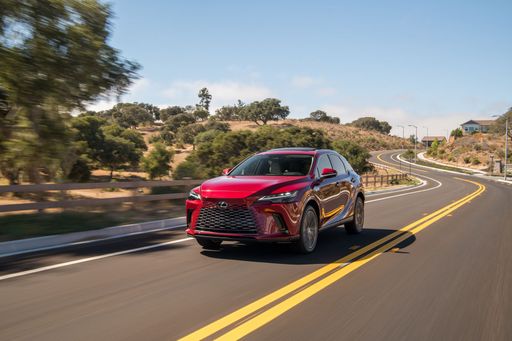
Lexus RX
Lexus RX
The Lexus RX glides through city streets with the kind of hushed refinement that turns mundane commutes into a private lounge. It mixes plush comfort and polished practicality in a package that suits buyers who want to arrive relaxed and a touch smug.
details
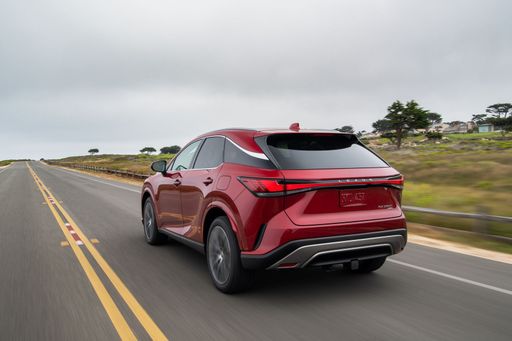
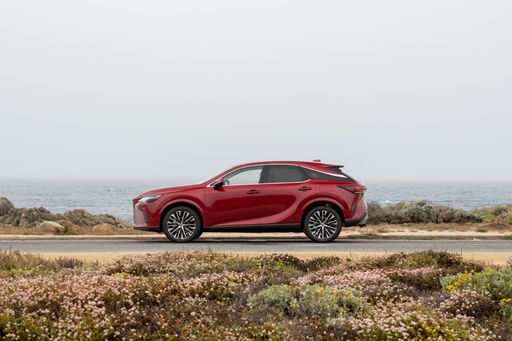
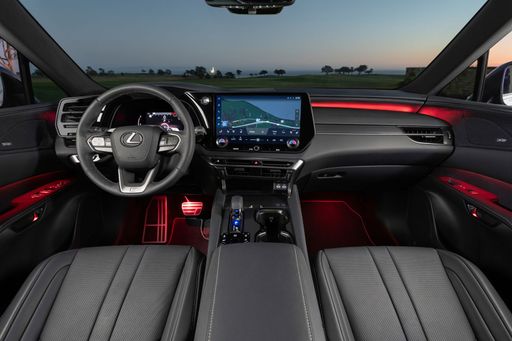
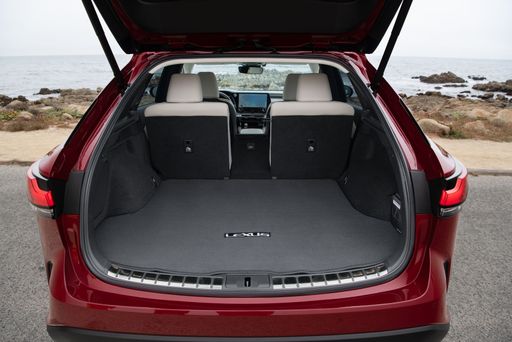
Mazda CX-80
The Mazda CX-80 brings polished, near-premium styling and a cabin that feels far classier than its badge might imply. It steers with a composed, engaging character and packs the sensible practicality families want — with just enough flair to make school runs feel a little less ordinary.
details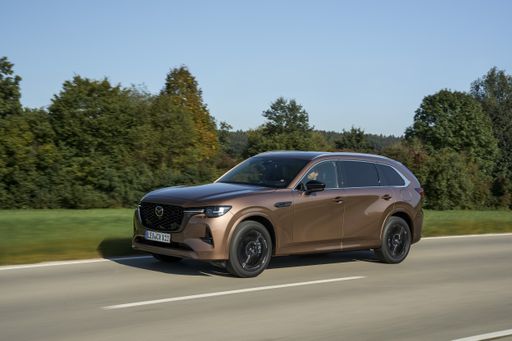
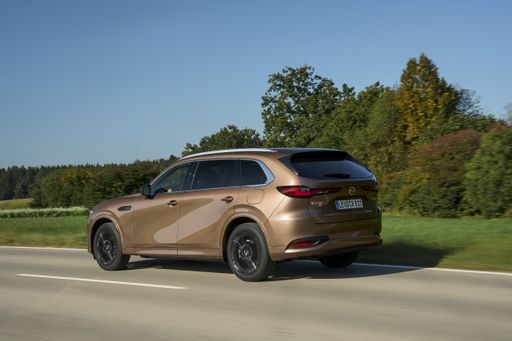
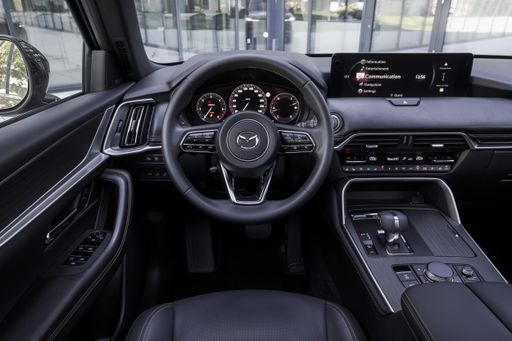
Costs and Consumption |
|
|---|---|
|
Price
63300 - 84700 £
|
Price
49300 - 61400 £
|
|
Consumption L/100km
3.3 - 8 L
|
Consumption L/100km
4 - 5.6 L
|
|
Consumption kWh/100km
-
|
Consumption kWh/100km
-
|
|
Electric Range
67 km
|
Electric Range
60 km
|
|
Battery Capacity
-
|
Battery Capacity
-
|
|
co2
75 - 182 g/km
|
co2
91 - 146 g/km
|
|
Fuel tank capacity
65 L
|
Fuel tank capacity
-
|
Dimensions and Body |
|
|---|---|
|
Body Type
SUV
|
Body Type
SUV
|
|
Seats
5
|
Seats
7
|
|
Doors
5
|
Doors
-
|
|
Curb weight
2040 - 2185 kg
|
Curb weight
2131 - 2240 kg
|
|
Trunk capacity
461 L
|
Trunk capacity
258 L
|
|
Length
4890 mm
|
Length
-
|
|
Width
1920 mm
|
Width
1890 mm
|
|
Height
1695 mm
|
Height
-
|
|
Max trunk capacity
1678 L
|
Max trunk capacity
-
|
|
Payload
575 - 620 kg
|
Payload
649 - 650 kg
|
Engine and Performance |
|
|---|---|
|
Engine Type
Full Hybrid, Plugin Hybrid
|
Engine Type
Plugin Hybrid, Diesel MHEV
|
|
Transmission
Automatic
|
Transmission
Automatic
|
|
Transmission Detail
Automatic Gearbox, CVT
|
Transmission Detail
Automatic Gearbox
|
|
Drive Type
All-Wheel Drive
|
Drive Type
All-Wheel Drive
|
|
Power HP
207 - 371 HP
|
Power HP
254 - 327 HP
|
|
Acceleration 0-100km/h
6.2 - 7.9 s
|
Acceleration 0-100km/h
6.8 - 8.4 s
|
|
Max Speed
210 km/h
|
Max Speed
-
|
|
Torque
551 Nm
|
Torque
500 - 550 Nm
|
|
Number of Cylinders
4
|
Number of Cylinders
4 - 6
|
|
Power kW
152 - 273 kW
|
Power kW
187 - 241 kW
|
|
Engine capacity
2393 - 2487 cm3
|
Engine capacity
2488 - 3283 cm3
|
General |
|
|---|---|
|
Model Year
2024 - 2025
|
Model Year
2025
|
|
CO2 Efficiency Class
G, E, B
|
CO2 Efficiency Class
B, E
|
|
Brand
Lexus
|
Brand
Mazda
|
Is the Lexus RX offered with different drivetrains?
The Lexus RX is offered with All-Wheel Drive.
